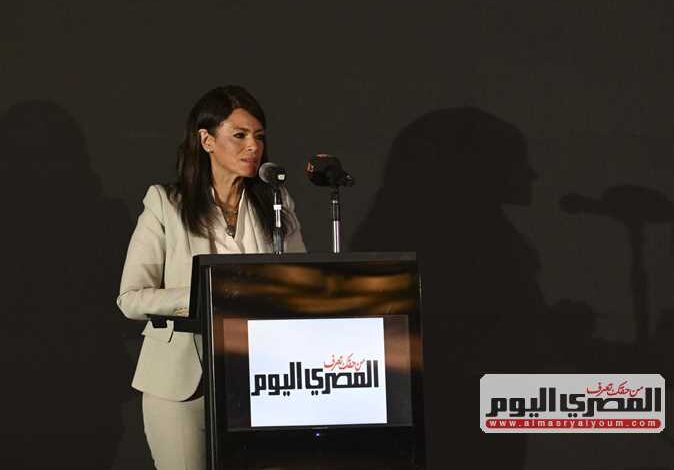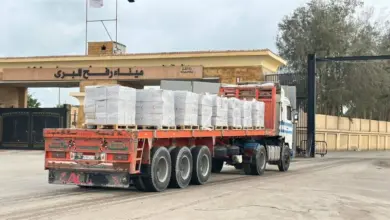
Minister of Planning, Economic Development, and International Cooperation Rania al-Mashat delivered the opening address at Al-Masry Al-Youm’s Economic Forum, which focused on the theme “A New Generation of Economic Policies”.
This event took place on Sunday and featured notable participants such as world-renowned economics professor Jeffrey Sachs, the UN Secretary-General’s Special Envoy for Financing the 2030 Agenda, Mahmoud Mohieldin, the Chairman of Al-Masry Al-Youm Foundation Mohamed Salmawy, and businessman Salah Diab.
The conference also attracted a distinguished assembly of economists and officials, including former Prime Minister of Egypt Ibrahim Mahlab, the CEO of the General Authority for Investment and Free Zones, Hossam Heiba, former Minister of Finance, Mohamed Maait, former Minister of Petroleum, Tarek al-Molla, former Minister of Industry Mounir Fakhry Abdel Nour and various economics professors and specialists.
The Global Economic Landscape & Consecutive Crises Since 2020
The Minister of Planning, Economic Development, and International Cooperation articulated in her address that the global economy has been experiencing various developments and crises since 2020.
Presently, the world is confronted with intricate and interrelated crises, potentially the most severe in recent decades.
These challenges are impacting the region in particular, as well as developing and least developed nations alongside persistent geopolitical tensions that influence the future prospects and credit ratings of countries within the region.
Development and Financing Gaps in Developing and Least Developed Countries
The minister observed that the world has been experiencing a series of unprecedented crises in recent years, beginning with the onset of the COVID-19 pandemic, which triggered a global economic downturn. This was subsequently exacerbated by escalating regional and international geopolitical tensions.
These factors have collectively contributed to a significant increase in inflation rates and heightened economic and social pressures, driven by a global rise in energy and food prices.
She further emphasized that the development disparities have markedly expanded in developing and least developed nations, necessitating urgent, comprehensive, and innovative measures to safeguard development achievements and ensure macroeconomic stability in these regions through 2030.
She noted that only 17 percent of the Sustainable Development Goals (SDGs) are currently on track.
A majority of countries around the globe are now susceptible to shocks stemming from international crises, including the climate crisis, which has concrete economic and social repercussions.
Al-Mashat asserted that most countries worldwide are far from realizing comprehensive and sustainable economic development. The financing shortfall for developing nations is estimated to range from $2.5 to four trillion dollars annually, as indicated in the 2024 Sustainable Development Financing report published by the United Nations.
This situation has resulted in increased public debt burdens, persistent macroeconomic instability, and rising costs for essential services such as healthcare and education.
Additionally, Al-Mashat pointed out that these ongoing crises are reshaping development policies on a global scale, with widening development gaps attributed to the inclination of many developed nations and certain regional and international economic blocs to create and implement policies that prioritize their own interests, thereby imposing restrictions that steer global movements in particular directions.
Examples include the European Union’s “Carbon Border Adjustment Mechanism” and the United States’ “Inflation Reduction Act (IRA),” among others.
According to the minister, the development gaps present significant opportunities for investment and attracting private sector financing.
Therefore, inclusive economic policies based on competitiveness, transparency, and collaboration between relevant stakeholders — including the government, the private sector, international financial institutions, and civil society organizations — are key and essential factors for overcoming these gaps.
She emphasized that these challenges underscore the urgent need for robust global cooperation mechanisms, which are now more essential than ever.
This entails the creation of a comprehensive and well-coordinated framework aimed at reforming the global financial system, a significant topic currently under discussion in international forums. She also underscored the importance of enhancing the stimulus package for the Sustainable Development Goals (SDGs) to help address the ongoing debt crisis and support developing nations in achieving sustainable economic growth.
Furthermore, she reiterated the necessity of improving the active involvement of developing countries in the governance of global financial systems.
Al-Mashat highlighted the importance of reevaluating the existing economic model to better alleviate poverty and ensure that investments are increasingly directed toward critical sectors such as education, healthcare, and infrastructure.
This approach aims to enhance economic and social conditions in developing countries, empowering them to establish more resilient and sustainable economies.
Public Debt Burdens & Exceeding Expenditures on Health and Education
The ongoing series of crises has led to unprecedented levels of public debt, exacerbating the challenges posed by climate change amidst a significant decline in the necessary financing required to address these issues. Additionally, the persistent rise in global inflation rates and the decrease in foreign direct investments are further compounded by disruptions in supply chains.
According to the United Nations Conference on Trade and Development (UNCTAD) report published in 2024, approximately 3.3 billion individuals, nearly half of the world’s population, reside in countries where interest payments on debt surpass total expenditures on health and education combined. The report also highlights a worrying trend in Africa, where the number of countries with a debt-to-GDP ratio exceeding 60 percent surged from 6 in 2013 to 27 by 2023.
Moreover, the International Debt Report released by the World Bank Group in December 2023 revealed that developing nations’ spending on debt servicing reached a staggering $444 billion in 2022.
This expenditure undoubtedly comes at the expense of vital resources that these countries need to invest in essential sectors such as health, education, and infrastructure, especially in their efforts to combat climate change.
In light of these crises, it has become of the utmost importance to amplify the voices of developing nations within international financial institutions and multilateral development banks.
Implementing comprehensive and long-term debt restructuring programs for developing countries is essential – this includes debt-for-development swap programs and enhancing access to innovative financial solutions, such as blended finance, green bonds, and others.
The significance of establishing Country-Led Platforms was also underscored, with an emphasis on prioritizing national development objectives in actionable solutions.
Furthermore, the implementation of national strategies for integrated financing is essential for the effective use of available natural resources. In a joint declaration issued in 2023, the World Bank and the International Monetary Fund expressed their dedication to supporting nations in the creation of these platforms, which are designed to attract additional climate financing, including private sector investment.
Restructuring the Global Financial System
In recent years, the international community has acknowledged the necessity of reforming the global financial system to ensure that development financing is equitable, thereby fostering a better future for upcoming generations.
This reform should facilitate efficient public expenditure, particularly in essential services, promote competitive economies led by the private sector, and establish transparent and effective monetary and financial systems for resource distribution.
It is also crucial to integrate development initiatives with climate change mitigation efforts.
Additionally, it is vital to create opportunities for the private sector and elevate the representation of developing and least developed countries within international financial institutions and multilateral development banks.
Innovative Development Financing
Simultaneously, there is an urgent requirement to broaden innovative development financing mechanisms to empower developing nations in effectively addressing the current economic and social challenges they encounter.
This expansion is vital for enabling these countries to cultivate more sustainable and resilient economies in anticipation of future disruptions.
The forthcoming Fourth Financing for Development Conference, set to take place in July 2025 in Spain, will concentrate on integrated solutions aimed at improving the management efficiency of public debt in developing and least developed countries. The conference will also tackle the future of Special Drawing Rights (SDRs), Gross Domestic Product (GDP), and the crucial role of international financial institutions and development partners in budget support programs.
The dangers associated with climate change have been emphasized, indicating that the expenses related to mitigating the effects of climate change far surpass the limited public resources at hand. Even with multilateral development institutions mobilizing all available funding to facilitate the green transition, they would only address 4 percent of the necessary financing.
In contrast, securing just 1.4 percent of global financial assets from the private sector would be adequate to close the climate financing gap. This stark reality highlights the essential contribution that the private sector must make in expediting the green transition.
It is important to recognize that the nation is not immune to these global and regional challenges. Consequently, the Egyptian government has adopted a proactive strategy to tackle these crises through a comprehensive developmental perspective, addressing various social, economic, and environmental concerns.
The state has initiated a national economic and structural reform program designed to implement effective measures and policies that promote macroeconomic stability.
This program is centered around three primary pillars: the first pillar aims to enhance the resilience and stability of the macro-economy, while the second seeks to improve the competitiveness of the Egyptian economy and the overall business environment.
The third pillar is focused on facilitating the green transition. Recently, the Ministry of Planning, Economic Development, and International Cooperation introduced a new framework aimed at achieving qualitative growth, which is founded on three main engines:
- Developing Data-Driven and Evidence-Based Economic Development Policies facilitates informed discussions regarding the needs and opportunities in various sectors, including human capital, industrial growth, small and medium-sized enterprises (SMEs), technology, entrepreneurship, sustainable infrastructure, and green investments. This approach also emphasizes the importance of establishing strong monitoring and evaluation systems to assess progress and enhance outcomes.
- Creating a Future-Resilient Economy promotes macroeconomic stability through the execution of structural reforms aimed at enhancing economic competitiveness, macro-fiscal resilience, and facilitating the green transition.
- Enhancing Resource Allocation involves the adoption of a comprehensive national financing framework that mobilizes both domestic and international funding, thereby directing resources toward priority sectors and accelerating the achievement of Sustainable Development Goals (SDGs).
The government is actively pursuing coordinated efforts to regulate and govern public spending, thereby creating space for the private sector. This is coupled with monitoring the financial performance of the state budget and launching tax and investment incentives that create a conducive environment for attracting both local and foreign investments.
According to recent plans, 42 percent of government investments in the economic and social development plan are directed toward human development, 37 percent towards industrial development, and 21 percent towards local development.
There is a firm commitment to complete coordination among the economic ministerial group to address the impacts of regional and international economic challenges.
Integrated National Development Financing Strategy
Additionally, Egypt has launched an Integrated National Strategy for Development Financing, representing a collaborative initiative between the Egyptian government and the United Nations during the Future Summit in New York.
This strategy focuses on identifying financing gaps in priority sectors. It encourages innovative financing solutions to mitigate financial risks and future debt burdens while enhancing the role of the private sector in national development efforts.
The Role of the Private Sector and the Hub for Advisory, Finance & Investment for Enterprises Platform
The launch of the “Hub for Advisory, Finance & Investment for Enterprises” platform was also highlighted, which provides financial and technical support to the private sector. This initiative is in implementation of the recommendations made during the Economic Conference held in 2022. It is part of the government’s efforts to leverage the best available innovative financing alternatives from international financial institutions and development partners to empower the private sector.
The platform serves as a comprehensive framework that connects development partners, executing agencies, the government, and the local business community.
Its primary objective is to foster communication and linkage between various private sector companies, whether large, small, medium, or startups, boosting their benefit from development financing, technical support, and consultancy services in effort to stimulate the private sector’s role in attaining comprehensive and sustainable development.
Country Platform for the “NWFE” Program
In accordance with the ongoing initiatives of the Ministry of Planning, Economic Development, and International Cooperation aimed at enhancing developmental cooperation and supporting the goals of the green transition, the Country Platform for the “NWFE” Program has been established.
This program serves as a national initiative that exemplifies a regional model and provides an effective framework for national platforms specifically tailored to attract climate investments focused on both mitigation and adaptation strategies to combat climate change.
The “NWFE” Program is distinguished by its national ownership and operates through a collaborative framework that unites a wide array of stakeholders, including government entities, multilateral development banks, international organizations, the private sector, and specialized climate investment funds. It employs innovative financial mechanisms such as blended financing, grants, and debt swaps, thereby establishing a strong framework to tackle the challenges associated with climate change.
By promoting this collaborative atmosphere, the “NWFE” Program aims to implement a human-centered strategy that effectively alleviates the negative impacts of climate change while addressing its fundamental causes. The Ministry of Planning, Economic Development, and International Cooperation is committed to ensuring the careful execution of structural reform programs.
This role involves the ongoing alignment of their objectives with those of all pertinent ministries and stakeholders.
Such dedication highlights the ministry’s extensive developmental responsibilities, particularly following the recent merger of the Ministry of Planning with the Ministry of Economic Development and International Cooperation.
This strategic consolidation enables the ministry to formulate, execute, and oversee a range of economic and social development plans and programs across various time frames.
Moreover, the ministry plays a crucial role in forming and stimulating bilateral and multilateral development collaborations with international development partners, fostering Egypt’s partnerships on the global level.
South-South Cooperation and Triangular Cooperation
The Egyptian government strongly asserts that its dedication to national economic development does not diminish its proactive involvement in various economic and developmental cooperation initiatives at regional, Arab, and international levels.
This engagement is rooted in Egypt’s steadfast commitment and ongoing aspiration to work alongside all members of the international community.
In this regard, the Ministry of Planning, Economic Development, and International Cooperation has recently introduced a comprehensive strategy focused on enhancing South-South and triangular cooperation.
This innovative strategy aims to maximize the advantages gained from partnerships and developmental programs with both developing nations and emerging economies, particularly emphasizing the African continent.
Furthermore, this initiative is in line with Egypt’s participation in BRICS and the New Development Bank, highlighting Egypt’s increasing influence in global economic affairs.
Looking forward, Egypt anticipates its upcoming involvement in the Third High-Level African Forum on South-South Cooperation and Triangular Cooperation for Sustainable Development, set to take place in Sierra Leone in 2025.
This participation not only reaffirms Egypt’s dedication to promoting collaborative efforts for sustainable development across the continent but also emphasizes its proactive role in shaping the future of cooperative initiatives aimed at benefiting developing countries globally.




